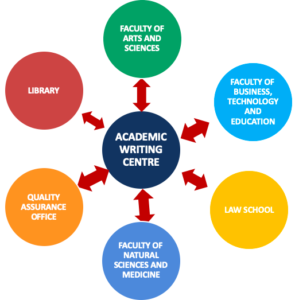Status and working specification
The Centre for Academic Writing represents a structural unit under the School of Business, but it provides teaching and consultation services to students of all ISU schools -both local and international, as well as university administration staff. Moreover, the Centre regularly and consistently cooperates with other administrative units, like ISU quality assurance office and library.

Arranged as a flatarchy structure, it is neither hierarchical nor fully flat, operating with flat project teams when carrying out a project, but all other times exercising a consultative, cooperative team-working spirit in all its activities, ranging from syllabi design and revision to continuing professional development and representing the Centre to the public. The Centre is run by the director together with three assistants; one is responsible for day-to-day activities of the Centre and two others take care of the Centre website, professional webpages and the e.learning (former Moodle) .
How do we work?
- More than 40 teachers deliver the courses developed in the Centre. They are employed every semester by one or several ISU schools.
- The Centre tutors work as academic writing teachers and are at the same time doing their doctoral studies. The tutorial hours they conduct are accumulated as their credit-points.
- The policy of the Centre is to take all decisions – both academic and administrative – by sharing opinions, discussion and mutual agreement.
- The teachers working with the Centre have regular working meetings, when professional issues are discussed and shared, challenges are analysed and strategic decisions made, new material and resources are introduced.
- The Centre teachers are offered qualification raising seminars and practical methodology or content workshops every semetre.
- The Centre head observes sessions during each semester, resulting in individual post-observation meetings to discuss all important aspects of teaching. Teachers from time to time do peer observations as well as swap groups or peer-teach.
- Before sessions sometimes (especially at the beginning of a term) teachers introduce their lesson plans, followed by a post-lesson reflection, thus sharing the expericence acquired through lectures, challenges faced and success stories.
- The Centre teachers have their own professional web page where all the course-related material is displayed along with their timetables, contact details and all the management related forms.
The Centre has already held two academic conferences. The first student conference was dedicated to academic integrity issues, in particular Plagiarism and its ten forms. The second conference – Working in Academic Paper: Problems and Challenges – was a teacher-student academic event, focusing the aspects of an academic paper bachelors have to write during the first year of their studies. The plans were to hold similar events every year, however due COVID-19 we decided to organize our next scientific conference online.
